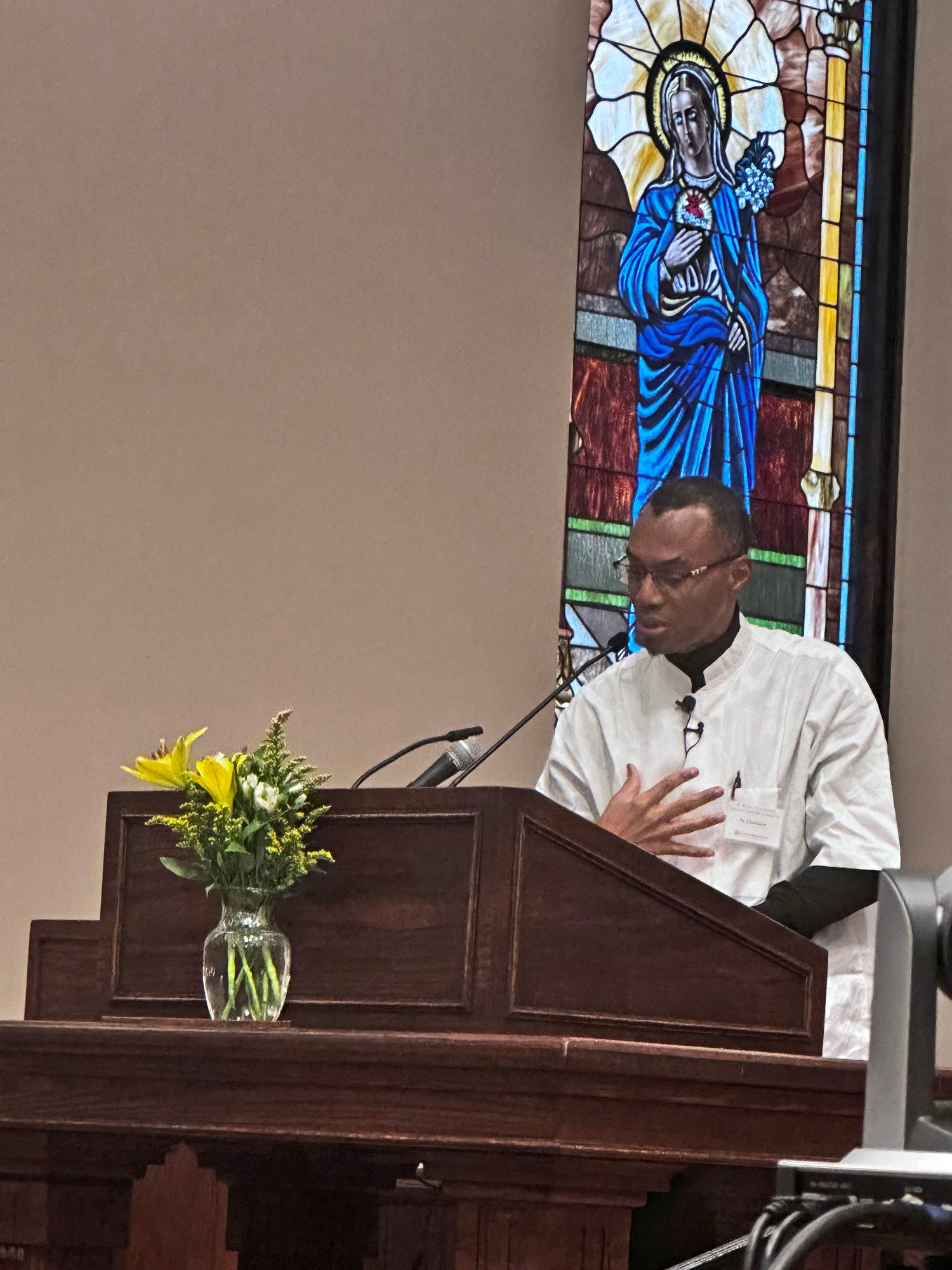Kennedy Lecture 2025
-
-
watch the 2025 kennedy lecture
-
-
-
The Future of a Listening Church
A Conversation with Fr. Agbonkhianmeghe E. Orobator, S.J.,
Saturday, Jan. 25, 2025
Dean and Professor, Jesuit School of Theology of Santa Clara University, CA.
8:30 am Coffee and book signing in Biss Hall
9:30 am Lecture in the Church (9:30-11:30 am)- Fr. Orobator will speak on “Women are the Teachers of Synodality. What Does the Bible Say About That?”
- After his remarks, Fr. Oorbator will be interviewed by former Charlotte Observer religion reporter Tim Funk, who attends St. Peter, and Toni Tupponce, who’s a writer and speaker on topics of social justice and cultural equity and an Our Lady of Consolation parishioner. They plan to ask Fr. Orobator about the role of women in a changing Church, the leadership of Pope Francis, the rapidly growing Church in Africa, our need to care for creation — and the Synod.
- There will be an opportunity after the event for book signing.
Come hear an internationally acclaimed theologian and author speak on the Synod in Rome (he was there), how women are a great gift to a changing church, the growth of Catholicism in Africa, and much more.
Fr. Orobator grew up in Benin City, Nigeria, where he first practiced traditional African religion. But, after visiting the local Jesuit parish as a teen for Easter vigil Mass, he became enamored with Catholicism and the Jesuit order. He was ordained in 1998. Fluent in four languages, with a PhD in theology and religious studies from the University of Leeds in England, he is a past president of the Jesuit Conference of Africa and Madagascar.His books include:
You will be able to purchase the books from Blue Bicycle Books during the book signing event. (Credit/debit cards only.)
-

-
reshaping the church for today
-
-
The 2023-2024 Synodabout the Synod and how it relates to the 25th Kennedy Lecture
-
what is the synod?
In the Roman Catholic Church, a synod has traditionally been a meeting of bishops. It has ancient roots, but the modern Synod was instituted near the end of Vatican II to discuss specific issues to better guide the church.
During his 11-year papacy, Pope Francis has convened several synods, including on the family, on youth and on the church in the pan-Amazon region.
-
pope francis invited lay people
The 2023-2024 Synod was different because it was not focused on just one issue.
And for the first time, Pope Francis invited lay people to be among the 365 voting members.
Women delegates numbered 54 — almost as many as the 61 cardinals. They all sat at round tables, “putting into practice,” as The New York Times reported, “the pope’s bottom-up view of a collegial and inclusive institution that upends the traditional hierarchy and forces bishops to listen to and work with their flock to better respond to their global church’s modern needs.”
-
What Happened?
Many of the more controversial issues broached in October 2023 were off the table during the second meeting in October 2024.
The one that grabbed the most headlines: Pope Francis’ decision to take the issue of ordaining women as deacons off the agenda.
Instead, he announced that a study committee will look into it and report findings to the pope in 2025.
The move angered many women, including members of Women’s Ordination Worldwide. But the synod did vote 258-97 to call for women to be given more leadership roles in the church.
-
Fr. Orobator’s assessment
Fr. Orobator noted:
“I think this was the first Synod that I know about where women were not talked about as a question or a problem, but where women actually stated and articulated in their own voice what they were concerned about in the church.”

-
-
-
who decided on the agenda for the 2023-2024 synod?
The working document for the meeting was compiled by a committee after an unprecedented two-year canvassing of rank-and-file Catholics around the globe. Including groups that met at St. Peter and at other parishes in the Charlotte diocese to prioritize issues worthy of greater attention.
Several sensitive topics within the church were up for discussion in Rome as the synod began in 2023, including steps to promote women to decision-making roles in the church, “radical inclusion” of LGBTQ+ Catholics, the extension of sacraments to the divorced and remarried, the inclusion of married men in the priesthood, and new accountability measures to check how bishops exercise their authority to prevent abuse.
-
-
Priority is listening
-
What is likely to be the most lasting impact of the Synod?
As Pope Francis said in his homily formally opening the Synod, “more than speaking, the priority is listening.” To each other and to the Holy Spirit. Some conservative cardinals objected to the whole idea of a Synod that questioned what they considered settled doctrine. But to many others, the main accomplishment of the Synod was the way it was conducted, with bishops and lay Catholics sitting together, acknowledging an increasingly global church and openly discussing issues once considered off-limits.Cardinal Blase Cupich, the archbishop of Chicago, put it this way: “The Synod’s final document is not the landing strip. It is a launch pad. We’re just beginning. We have no idea how this is going to unfold.”
-


